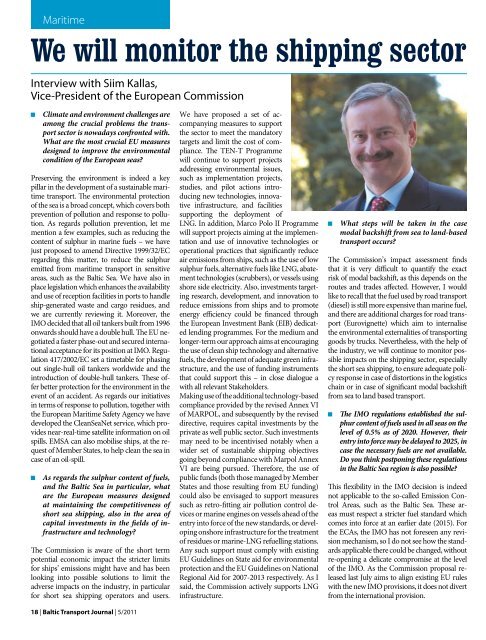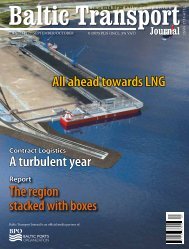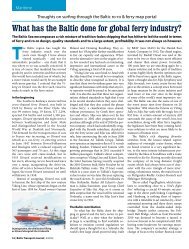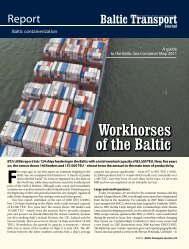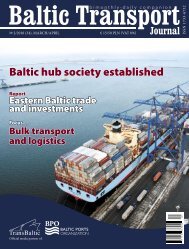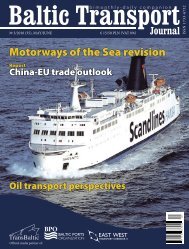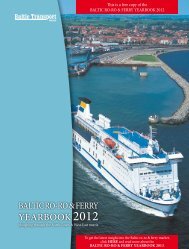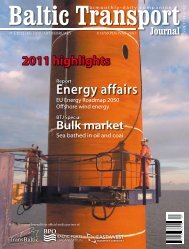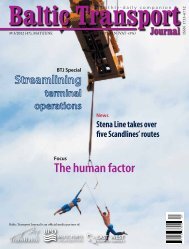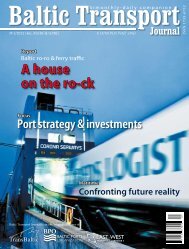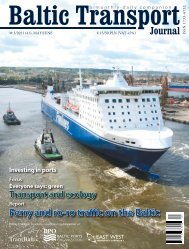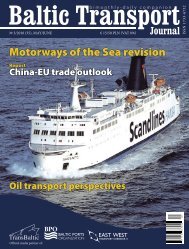BTJ 5/2011 - Baltic Press
BTJ 5/2011 - Baltic Press
BTJ 5/2011 - Baltic Press
- No tags were found...
You also want an ePaper? Increase the reach of your titles
YUMPU automatically turns print PDFs into web optimized ePapers that Google loves.
MaritimeWe will monitor the shipping sectorInterview with Siim Kallas,Vice-President of the European Commission Climate and environment challenges areamong the crucial problems the transportsector is nowadays confronted with.What are the most crucial EU measuresdesigned to improve the environmentalcondition of the European seas?Preserving the environment is indeed a keypillar in the development of a sustainable maritimetransport. The environmental protectionof the sea is a broad concept, which covers bothprevention of pollution and response to pollution.As regards pollution prevention, let memention a few examples, such as reducing thecontent of sulphur in marine fuels – we havejust proposed to amend Directive 1999/32/ECregarding this matter, to reduce the sulphuremitted from maritime transport in sensitiveareas, such as the <strong>Baltic</strong> Sea. We have also inplace legislation which enhances the availabilityand use of reception facilities in ports to handleship-generated waste and cargo residues, andwe are currently reviewing it. Moreover, theIMO decided that all oil tankers built from 1996onwards should have a double hull. The EU negotiateda faster phase-out and secured internationalacceptance for its position at IMO. Regulation417/2002/EC set a timetable for phasingout single-hull oil tankers worldwide and theintroduction of double-hull tankers. These offerbetter protection for the environment in theevent of an accident. As regards our initiativesin terms of response to pollution, together withthe European Maritime Safety Agency we havedeveloped the CleanSeaNet service, which providesnear-real-time satellite information on oilspills. EMSA can also mobilise ships, at the requestof Member States, to help clean the sea incase of an oil-spill. As regards the sulphur content of fuels,and the <strong>Baltic</strong> Sea in particular, whatare the European measures designedat maintaining the competitiveness ofshort sea shipping, also in the area ofcapital investments in the fields of infrastructureand technology?The Commission is aware of the short termpotential economic impact the stricter limitsfor ships’ emissions might have and has beenlooking into possible solutions to limit theadverse impacts on the industry, in particularfor short sea shipping operators and users.18 | <strong>Baltic</strong> Transport Journal | 5/<strong>2011</strong>We have proposed a set of accompanyingmeasures to supportthe sector to meet the mandatorytargets and limit the cost of compliance.The TEN-T Programmewill continue to support projectsaddressing environmental issues,such as implementation projects,studies, and pilot actions introducingnew technologies, innovativeinfrastructure, and facilitiessupporting the deployment ofLNG. In addition, Marco Polo II Programmewill support projects aiming at the implementationand use of innovative technologies oroperational practices that significantly reduceair emissions from ships, such as the use of lowsulphur fuels, alternative fuels like LNG, abatementtechnologies (scrubbers), or vessels usingshore side electricity. Also, investments targetingresearch, development, and innovation toreduce emissions from ships and to promoteenergy efficiency could be financed throughthe European Investment Bank (EIB) dedicatedlending programmes. For the medium andlonger-term our approach aims at encouragingthe use of clean ship technology and alternativefuels, the development of adequate green infrastructure,and the use of funding instrumentsthat could support this – in close dialogue awith all relevant Stakeholders.Making use of the additional technology-basedcompliance provided by the revised Annex VIof MARPOL, and subsequently by the reviseddirective, requires capital investments by theprivate as well public sector. Such investmentsmay need to be incentivised notably when awider set of sustainable shipping objectivesgoing beyond compliance with Marpol AnnexVI are being pursued. Therefore, the use ofpublic funds (both those managed by MemberStates and those resulting from EU funding)could also be envisaged to support measuressuch as retro-fitting air pollution control devicesor marine engines on vessels ahead of theentry into force of the new standards, or developingonshore infrastructure for the treatmentof residues or marine-LNG refuelling stations.Any such support must comply with existingEU Guidelines on State aid for environmentalprotection and the EU Guidelines on NationalRegional Aid for 2007-2013 respectively. As Isaid, the Commission actively supports LNGinfrastructure. What steps will be taken in the casemodal backshift from sea to land-basedtransport occurs?The Commission’s impact assessment findsthat it is very difficult to quantify the exactrisk of modal backshift, as this depends on theroutes and trades affected. However, I wouldlike to recall that the fuel used by road transport(diesel) is still more expensive than marine fuel,and there are additional charges for road transport(Eurovignette) which aim to internalisethe environmental externalities of transportinggoods by trucks. Nevertheless, with the help ofthe industry, we will continue to monitor possibleimpacts on the shipping sector, especiallythe short sea shipping, to ensure adequate policyresponse in case of distortions in the logisticschain or in case of significant modal backshiftfrom sea to land based transport. The IMO regulations established the sulphurcontent of fuels used in all seas on thelevel of 0.5% as of 2020. However, theirentry into force may be delayed to 2025, incase the necessary fuels are not available.Do you think postponing these regulationsin the <strong>Baltic</strong> Sea region is also possible?This flexibility in the IMO decision is indeednot applicable to the so-called Emission ControlAreas, such as the <strong>Baltic</strong> Sea. These areasmust respect a stricter fuel standard whichcomes into force at an earlier date (2015). Forthe ECAs, the IMO has not foreseen any revisionmechanism, so I do not see how the standardsapplicable there could be changed, withoutre-opening a delicate compromise at the levelof the IMO. As the Commission proposal releasedlast July aims to align existing EU ruleswith the new IMO provisions, it does not divertfrom the international provision.


